

Chris Hedges at Moravian College: The Myth of Human Progress and the Collapse of Complex Societies. MrJim - Why There is No Salvation in Technology. The Coup D’etat Is Over, the Corporations Won (Chris Hedges) Chris Hedges: The Myth of Human Progress and the Collapse of Complex Societies - Chris Hedges. The Myth of Human Progress and the Collapse of Complex Societies Posted on Jan 26, 2014 By Chris Hedges Editor’s note: The following is the transcript of a speech that Chris Hedges gave in Santa Monica, Calif., on Oct. 13, 2013.
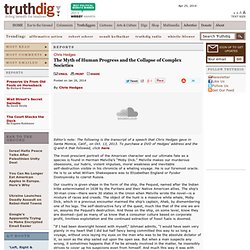
To purchase a DVD of Hedges’ address and the Q-and-A that followed, click here. The most prescient portrait of the American character and our ultimate fate as a species is found in Herman Melville’s “Moby Dick.” Our country is given shape in the form of the ship, the Pequod, named after the Indian tribe exterminated in 1638 by the Puritans and their Native American allies. “If I had been downright honest with myself,” Ishmael admits, “I would have seen very plainly in my heart that I did but half fancy being committed this way to so long a voyage, without once laying my eyes on the man who was to be the absolute dictator of it, so soon as the ship sailed out upon the open sea. Our financial system—like our participatory democracy—is a mirage. The Collapse of Complex Societies (New Studies in Archaeology): Joseph A. Tainter: 9780521386739: Amazon.com.
Requiem for a Species, wikipedia. Requiem for a Species: Why We Resist the Truth about Climate Change is a 2010 book by Australian academic Clive Hamilton which explores climate change denial and its implications.

It argues that climate change will bring about large-scale, harmful consequences for habitability for life on Earth including humans, which it is too late to prevent.[1][2] Hamilton explores why politicians, corporations and the public deny or refuse to act on this reality. He invokes a variety of explanations, including wishful thinking, ideology, consumer culture and active lobbying by the fossil fuel industry.[3] The book builds on the author's fifteen-year prior history of writing about these subjects, with previous books including Growth Fetish and Scorcher: The Dirty Politics of Climate Change. Themes[edit] Hamilton points out that there have been many reports and books over the years explaining the climate change problem and just how ominous the future looks for humanity. Reception[edit] Author[edit] LibriVox, Fredrich Nietzsche. Beyond Good and Evil, wikipedia. Beyond Good and Evil: Prelude to a Philosophy of the Future (German: Jenseits von Gut und Böse: Vorspiel einer Philosophie der Zukunft) is a book by philosopher Friedrich Nietzsche, first published in 1886.

LibriVox, The Twilight of the Idols. Friedrich NIETZSCHE (1844 - 1900), translated by Anthony Mario LUDOVICI (1882 - 1971) Of The Twilight of the Idols, Nietzsche says in Ecce Homo: “If anyone should desire to obtain a rapid sketch of how everything before my time was standing on its head, he should begin reading me in this book.

That which is called ‘Idols’ on the title-page is simply the old truth that has been believed in hitherto. Twilight-of-the-idols-friedrich-neitzsche. Twilight of the Idols, wikipedia. Twilight of the Idols, or, How to Philosophize with a Hammer (German: Götzen-Dämmerung, oder, Wie man mit dem Hammer philosophiert) is a book by Friedrich Nietzsche, written in 1888, and published in 1889.
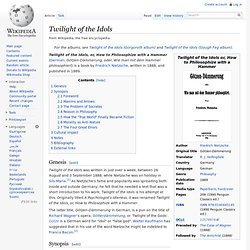
Genesis[edit] Twilight of the Idols was written in just over a week, between 26 August and 3 September 1888, while Nietzsche was on holiday in Sils-Maria.[1] As Nietzsche's fame and popularity was spreading both inside and outside Germany, he felt that he needed a text that was a short introduction to his work; Twilight of the Idols is his attempt at this. Beyond Good and Evil. Beyond Good and Evil, Project Gutenberg. Beyond Good and Evil, by Friedrich Nietzsche. Friedrich Nietzsche, wikipedia. Friedrich Wilhelm Nietzsche (/ˈniːtʃə/[1] or /ˈniːtʃi/;[2] German: [ˈfʁiːdʁɪç ˈvɪlhɛlm ˈniːt͡sʃə]; 15 October 1844 – 25 August 1900) was a German philosopher, cultural critic, poet, composer and Latin and Greek scholar.
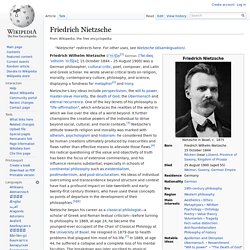
He wrote several critical texts on religion, morality, contemporary culture, philosophy and science, displaying a fondness for metaphor[3] and irony. Nietzsche's key ideas include perspectivism, the will to power, the death of God, the Übermensch and eternal recurrence. One of the key tenets of his philosophy is "life-affirmation", which embraces the realities of the world in which we live over the idea of a world beyond. Nietzsche began his career as a classical philologist—a scholar of Greek and Roman textual criticism—before turning to philosophy. Friedrich Nietzsche. 1.
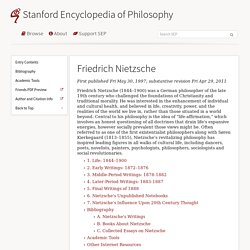
Life: 1844–1900 In the small German village of Röcken bei Lützen, located in a rural farmland area southwest of Leipzig, Friedrich Wilhelm Nietzsche was born at approximately 10:00 a.m. on October 15, 1844. The date coincided with the 49th birthday of the Prussian King, Friedrich Wilhelm IV, after whom Nietzsche was named, and who had been responsible for Nietzsche's father's appointment as Röcken's town minister. Nietzsche's uncle and grandfathers were also Lutheran ministers, and his paternal grandfather, Friedrich August Ludwig Nietzsche (1756–1826), was further distinguished as a Protestant scholar, one of whose books (1796) affirmed the “everlasting survival of Christianity.” Truthdig's sounds. Hedghes Quoting Nietzsche. Amazon, Human Impact on Ancient Environments. A Short History of Progress. Background[edit] Prior to being selected to deliver the Massey Lectures, Wright had written award-winning fiction and non-fiction books that deal with anthropology and civilizations.
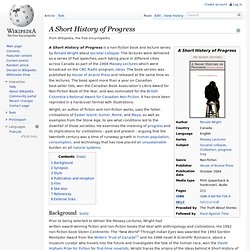
His 1992 non-fiction book Stolen Continents: The "New World" Through Indian Eyes was awarded the 1993 Gordon Montador Award from the Writers' Trust of Canada[1] and his 1998 novel A Scientific Romance, about a museum curator who travels into the future and investigates the fate of the human race, won the David Higham Prize for Fiction for first-time novelists. The Power Elite by Write Mills 1956.
The Power Principle. Twilight of Idols by Friedrich Nietzsche. Beyond Good and Evil by Fredrich Nietzshe. Myth of Progress.